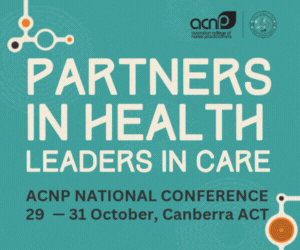A special interest group aiming to raise the profile of gerontological nursing as a challenging and rewarding speciality that makes a vital contribution to the health and wellbeing of older Australians has been launched.
The Gerontological Alliance of Nurses Australia (GANA) brings together a community of specialist nurses and assistants who work across aged care. It will offer a forum that supports the professional development of all nurses in the sector, including students, AINs. ENs, RNs, and academics, to deliver high-quality care.
Speaking at last week’s online launch, co-founder Victoria Traynor, Professor of Nursing at the University of Wollongong, and leader of gerontological nursing competencies delivered nationally, said the group was formed to unite gerontological nurses working across Australia in all types of aged care settings.
“Underpinning our motivation for creating GANA is to make it possible for there to be clear career pathways in gerontolgical nursing,” Professor Traynor said.
“In the acute care setting, there are more straightforward ways to create your career. In aged care, there are possible avenues for you to have your career but you have to work quite hard to create those opportunities, and you have to be really diligent at taking up opportunities.”
Professor Traynor, who began her career as an AIN in nursing homes in Scotland, said gerontological nursing deserved to be recognised as a unique nursing specialty, yet, was often disregarded.
“The outside world don’t really understand the specialist nature of gerontological nursing and nurses working in gerontological areas don’t always acknowledge that specialism themselves. They take on board some of the negative images of aged care nursing and talk about only just doing aged care nursing. We’re working to turning that around so that externally as well as within aged care, people know about the specialist practice.”
Fellow co-founder Dr Kasia Bail, Associate Professor of Nursing at the University of Canberra, told attendees how the aged care sector’s problems dated back to the Aged Care Act 1997, which removed requirements for RNs in residential care. Over the years, unsurprisingly, this has led to missed care and, more broadly, both not enough nurses working in aged care, and not enough nurses with gerontological experience to teach the next generation coming through.
Dr Bail said it was now crucial to bolster the recognition of gerontological nursing as a specialisation within nursing and promote its positive impacts on patients.
Critically, to meet the Aged Care Royal Commission’s recommendations, there will need to be a 45% increase in RNs in 2023. The Fair Work Commission (FWC) is also currently considering applications for 25% pay increases for aged care workers.
“We know that staff enjoy working in safe workplaces and where they feel satisfied with the quality of care that they can provide and that this is more likely to impact on retention,” Dr Bail argued.
“We know that quality of care is motivating and that the reasons nurses don’t want to work in aged care actually have nothing to do with older people.”
GANA hopes to achieve its mission by promoting the wisdom of First Nations Australians, forming alliances with like-minded organisations, raising the profile of gerontological nursing as a rewarding speciality, creating mentoring opportunities for nurses specialising in gerontology, and nurturing the next generation of gerontological nurses.
Dr Bail, who participated in the recent aged care workforce’s pre-Jobs and Skills Summit Roundtable at Parliament House, echoed Aged Care Minister Anika Wells’ message during the meeting that ‘Now is the time’ for action.
“We’ve got this public support and policy momentum but it’s going to take people like us and more people to get on board to be able to make this happen,” Dr Bail said.
“Sometimes we hear that aged care isn’t sexy or nobody wants to work in aged care, nobody wants to work with older people, that’s not what nurses want to do. I know that people want to do this work and I challenge everybody to never say that ever again because every time you say it, we are extending that as a stereotype.
“Now is the time to really recognise this nursing speciality. Older people with complex needs; accumulated multiple morbidities, accumulated life experiences, preferences and lifestyles. We need specialists to help people to live their best with any impairments that they might have accumulated and to manage those complex transitions.”
Speaking at the launch, Nerissa Askelin shared her seven-year journey from AIN to recently graduating as an RN, and now wanting to become a Gerontologist Nurse Practitioner.
When starting out as an AIN on a dementia support unit, she quickly realised the deep problems in aged care.
“My rose-coloured glasses came off pretty quick. I was absolutely horrified. It didn’t take a Royal Commission into aged care to make me realise that what I was experiencing in a dementia specific ward was not right. Poor staff-to-staff ratios stretched even the most passionate aged care worker to breaking point, and let’s face it, most people who work as assistants in nursing or carers in aged care don’t do it for the money. They do it because they value society’s most important asset – the older person.”
Over the years, Nerissa has continued to build her skills and qualifications in a bid to provide better quality care for older Australians. She recently secured her dream job, working in a ward at the University of Canberra Hospital that specialises in rehabilitation for older people.
“I get to look after our most valuable assets, the older person,” she said proudly.
Similarly, Vani David, who works as a Clinical Nurse Consultant in aged care at the Wollongong Hospital and teaches nurses on the ward, told attendees that gerontological nursing should be considered a nursing speciality.
“We need to be working towards empowering and supporting aged care nurses to believe that it’s a speciality and believe that they are making an impact in aged care, whether in acute care or in a nursing home.”
Indigenous leader Professor Tom Calma, the University of Canberra’s chancellor for the past nine years, and more recently appointed to the Aged Care Council of Elders, said groups like GANA were crucial in the looming challenge to find enough nurses to meet forthcoming legislative changes in aged care, including registered nurses on site 24/7.
“When you start to get down to the specialisations like gerontology and gerontological nurses and palliative care nurses its high demand and low supply,” Professor Calma explained.
“I think the university sector really does have a role to play to start to ramp up what we’re able to do in these specialisations and being able to offer them and I think this is where GANA is so well placed to put pressure on the sector and on the government to make sure that we’re able to do it.
“Because, whilst the government’s aspirations are currently to have nurses in the aged care sector, and across the board, the supply and the actual funding to be able to support the development of nurses hasn’t quite caught up with the demand. So groups like GANA will have a really important role to play in strong advocacy and lobbying within the sector because the members are the specialists and know what we’re doing and need to make all politicians and bureaucrats understand that they too will get old and they too will be requiring the services at some part of their life of a support nurse, be it healthcare or gerontological nursing, or general nursing.”
Find more about GANA here








